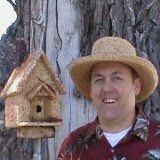
A survey was conducted and found that very few Americans really understand the pollination process between flora and fauna.
The reason is, that we relate pollen to allergies, itchy eyes and sneezing. We don't realize that for one out of every three bites we eat, we need to thank a bat, bee, bird or other pollinator.
Bats perform a vital ecological role by pollinating flowers, and also serve an important role in seed dispersal.
Many tropical plants are entirely dependent on bats, birds and bees.
Food producers and consumers, scientists and educators, beekeepers and wildlife enthusiasts who are concerned that a basic fact of life -- our dependence on the functional relationships between plants and pollinators -- is being ignored.
We can help do away with the willing, or unwilling ignorance, concerning these little creatures.
A large number of insecticides used in agriculture are toxic to pollinating insects and wildlife that are premiere carries of pollination.
Interactions between plants and their pollinators are essential to healthy functioning of wild and agricultural communities.
Instead of being part of the problem, we can be a part of the solution.
The reason is, that we relate pollen to allergies, itchy eyes and sneezing. We don't realize that for one out of every three bites we eat, we need to thank a bat, bee, bird or other pollinator.
Bats perform a vital ecological role by pollinating flowers, and also serve an important role in seed dispersal.
Many tropical plants are entirely dependent on bats, birds and bees.
Food producers and consumers, scientists and educators, beekeepers and wildlife enthusiasts who are concerned that a basic fact of life -- our dependence on the functional relationships between plants and pollinators -- is being ignored.
We can help do away with the willing, or unwilling ignorance, concerning these little creatures.
Pollination is not a free service. We must do our part to conserve all pollinators if we want to live in a natural, pesticide free environment.
Bats, birds, owls and other creatures are Cavity and Cave dwellers by nature. One way we can help this shortage is to provide artificial cavities known as nesting boxes. They will help boost the population of these natural insect controllers and pollinators and provide our lands and neighborhoods an alternative solution to man made chemicals which harm our environment.
Few people realize that the U.S. now applies twice the amount of pesticides it used in 1962. In Canada during the mid-1970s, aerial spraying of coniferous forest pests reduced native bee populations to the point that blueberry yields fell below the norm for four years.A large number of insecticides used in agriculture are toxic to pollinating insects and wildlife that are premiere carries of pollination.
Interactions between plants and their pollinators are essential to healthy functioning of wild and agricultural communities.
Instead of being part of the problem, we can be a part of the solution.
For more information how you can help: www.wildlife-houses.com

No comments:
Post a Comment